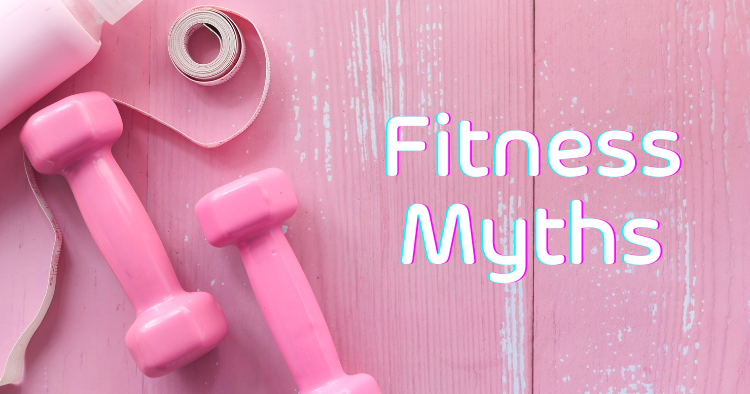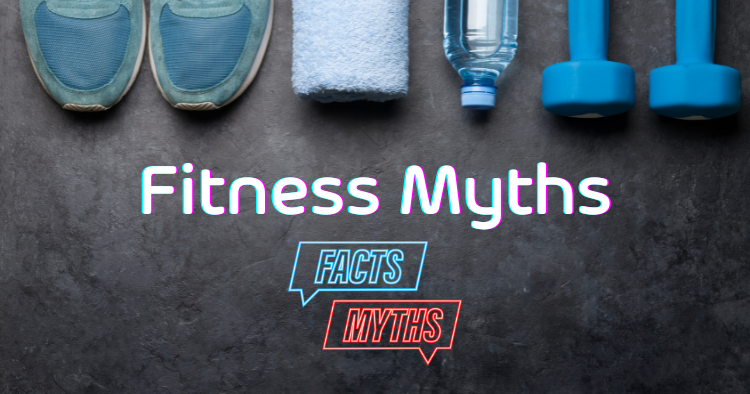Top 10 Fitness Myths Debunked: What Science Really Says Apart from yoga mats and dumbbells, the fitness sector is full of false knowledge and misunderstandings. These misconceptions mean that even the most committed fitness fan runs the danger of delayed development and perhaps injury. Using scientific data, we will bust the top 10 fitness misconceptions in this article so you may decide how best to improve your workout.

Myth 1: No Pain, No Gain
- Truth: Pain does not indicate a successful exercise. Although muscle soreness is a sign of muscular adaptation and development, constant discomfort points to damage. Pay attention to your body and tell good from bad pains.
Myth 2: Spot Reduction is Possible
- Truth: Exercise cannot help you specifically target fat reduction in any one place. Depending on genes, food, and general level of exercise, fat loss happens all across the body. Emphasize total fat loss with a sensible diet and consistent exercise.
Myth 3: You Need to Work Out Every Day
- Rest days are really vital for muscular development and repair. Burnout, tiredness, and injury may all result from overtraining. Try a three to five day weekly balanced program that includes rest and recuperation days.
Myth 4: Cardio is the Only Way to Lose Weight
- Truth: Although aerobics burns calories, strength training increases muscle mass, hence boosting metabolism and encouraging fat reduction. For weight reduction, cardio and strength training taken together are best.
Myth 5: Lifting Weights Will Make You Bulky
- Truth: Developing major muscular bulk calls for certain exercise and food. Most individuals find that weightlifting tones and strengthens muscles without producing bulkiness. Particularly, women lack the testosterone required for very rapid muscular development.
Myth 6: More Sweat Means a Better Workout
- Truth: Sweat is not a gauge of exercise intensity or calorie burn; rather, it is your body’s means of cool-down. Pay more attention to the kind and length of your exercise than to your sweating level.
Myth 7: You Can Out-Exercise a Bad Diet
- Truth: Weight control and fitness depend critically on nutrition. A well-balanced diet enhances your workout program by supplying the nutrients needed for general health, energy, and recuperation. Exercise by itself cannot offset bad eating habits.
Myth 8: You Should Avoid Carbs to Lose Weight
- Truth: Carbohydrates are your body’s primary energy source, particularly when you’re working out. Emphasize eating complex carbohydrates like whole grains, fruits, and vegetables, which offer sustained energy and vital nutrients, rather than cutting carbs entirely.
Myth 9: Women Should Avoid Lifting Heavy Weights
- Truth: By growing muscle, raisingbone density, and encouraging a good metabolism, heavy lifting helps men and women equally. Women can raise significant weights without worrying about becoming too muscular.
Myth 10: Stretching Before Exercise Prevents Injuries
- Truth: While it doesn’t much prevent injuries, static stretching before an exercise can lower performance. To boost blood flow and prepare muscles for exercise, instead include active warm-ups. Save for the cool-down period of static stretching.
Conclusion
We want to give you the correct knowledge to improve your exercise path by dispelling these typical fitness fallacies. Recall that the secret to success is a well-balanced strategy with enough rest, a healthy diet, and several kinds of activities. Keep educated, pay attention to your body, and appreciate your path to fitness!
FAQs
1. One may say that stopping exercise causes muscles to convert into fat.
- Answer: Two separate tissues are muscle and fat; hence, the answer is no. Muscle mass may drop when you stop working out, and fat accumulation might result from a high calorie intake, even in this case. Still, muscle does not convert into fat.
2. Does one require protein supplements to develop muscles?
- Answer: If you get enough protein from your food, ,proteins are necessary, d even if they can be handy. Lean meats, dairy, and legumes are among whole food sources high in nutrients needed for muscular development.
3. For weight loss, is fasting cardio more successful?
- Answer: Everybody’s fasted cardio effectiveness is different. Althoughsomeh suggests it can boost fat oxidation, overall fat loss may not be much affected by it. Your own taste and physical response should be your guiding factors..
4. Can you lose weight by only doing strength training?
- Answer: Yes, strength training can contribute to weight loss by increasing muscle mass, which boosts metabolism. However, combining it with cardio and a balanced diet can enhance weigh loss results.
5. Before or after a workout, should you eat?
- Answer: Nutrition both beforehand after exercise, e is vital. While post-workout diet helps in recuperation and muscle repair, eating a balanced breakfast or snack before an exercise supplies energy. For best effects, pick foods high in carbohydrates and protein.










